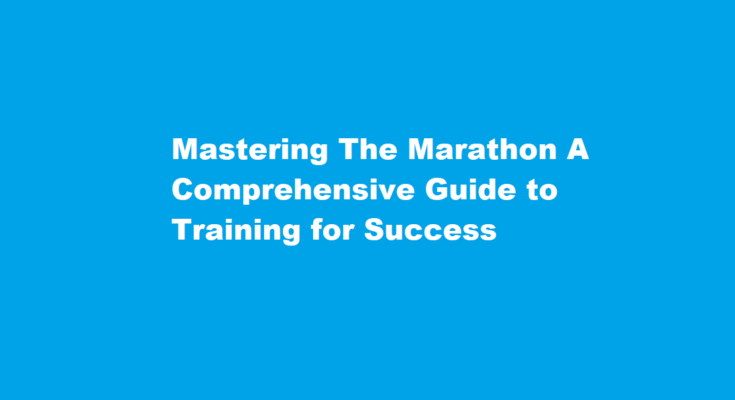Introduction
Embarking on the journey to run a marathon is a profound challenge that requires dedication, perseverance, and a well-structured training plan. Running 26.2 miles demands not only physical endurance but also mental fortitude. This article will provide a comprehensive guide on how to train for a marathon, emphasising the crucial aspects of preparation, from setting realistic goals to maintaining a healthy mindset throughout the process.
Set Clear and Realistic Goals
Before lacing up your running shoes, it is vital to set clear and achievable goals for your marathon training. Establishing your target time and understanding your current fitness level will help you structure a personalised plan. Be realistic about your expectations and consider the time commitment required for training. Whether your aim is to finish your first marathon or set a personal record, breaking down your objectives into smaller milestones will make the process more manageable and rewarding.
Build a Solid Foundation
Begin your training by establishing a strong foundation of cardiovascular fitness and endurance. If you are relatively new to running, start with a Couch to 5K program or gradually increase your running distance and frequency. For seasoned runners, focus on improving your base mileage and long-distance runs. A well-rounded training plan should incorporate a mix of running, cross-training, and rest days to prevent injuries and maintain overall fitness.
Follow a Structured Training Plan
A structured marathon training plan is essential for consistent progress and injury prevention. There are various plans available online, tailored for different fitness levels and goals. Choose one that aligns with your objectives and schedule. An ideal plan should include progressive long runs, speed work, tempo runs, and recovery runs. Remember to listen to your body and adapt the plan if necessary, allowing for adequate rest and recovery when needed.
Nutrition and Hydration
Proper nutrition and hydration are fundamental for marathon training. Fuel your body with a balanced diet that includes sufficient carbohydrates, protein, and healthy fats. Stay hydrated throughout the day, and remember to drink during long runs. Experiment with pre-run meals to find what works best for you. During the marathon, rely on familiar fueling options like energy gels or sports drinks to sustain your energy levels.
Injury Prevention and Cross-training
Injury prevention is paramount during marathon training. Include cross-training activities like cycling, swimming, or yoga to reduce the risk of overuse injuries. Strengthening exercises, such as core workouts and resistance training, can improve running form and stability. Listen to your body and address any potential issues promptly to avoid more severe injuries that could derail your training.
Mental Preparation
Mental preparation is often underestimated but crucial for marathon success. Cultivate a positive mindset, visualise crossing the finish line, and focus on the progress you’ve made during training. Develop coping strategies to manage fatigue and self-doubt during long runs. Participating in shorter races and building a supportive community of fellow runners can boost motivation and confidence.
Tapering
As the marathon date approaches, taper your training to allow your body to recover fully and be at its peak on race day. Reduce your mileage and intensity gradually in the last few weeks leading up to the event.
FREQUENTLY ASKED QUESTIONS
How do I prepare for a 42 km marathon?
For the 42-kilometre marathon (42.195km to be precise), eight weeks minimum are necessary to adequately prepare. Your training plan should include endurance and interval workouts that will gradually improve your performance. Recovery sessions and rest days are also essential both physically and mentally.
How do I train myself for a marathon?
The goal is to get comfortable running three to four times a week, with your longest run being roughly 5 or 6 miles. Pushing yourself too far too fast could result in injuries, so make sure to take your time: you can start by running 1 or 1.5 miles and build up week after week. And remember that it’s okay to walk!
Conclusion
Training for a marathon is a transformative journey that requires commitment and dedication. By setting clear goals, following a structured plan, and taking care of your physical and mental well-being, you can conquer the challenge and achieve your marathon dreams. Remember, the key to success lies in finding joy in the process and celebrating your progress along the way.
Read Also : Unlocking The Power of Excel Formulas for Data Analysis



